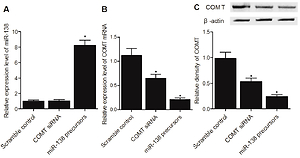Current issue
Archive
Manuscripts accepted
About the Journal
Editorial office
Editorial board
Section Editors
Abstracting and indexing
Subscription
Contact
Ethical standards and procedures
Most read articles
Instructions for authors
Article Processing Charge (APC)
Regulations of paying article processing charge (APC)
UROLOGY / CLINICAL RESEARCH
Both AA genotype of rs165599 and Val/Val genotype of rs4680 in COMT are associated with an increased risk of recurrence of prostate cancer
1
Central Laboratory, Xiaogan Hospital Affiliated with Wuhan University of Science and Technology, Xiaogan Central Hospital, Xiaogan, China
2
Department of Urology, Xiaogan Hospital Affiliated with Wuhan University of Science and Technology, Xiaogan Central Hospital, Xiaogan, China
3
Department of General Surgery, Xiaogan Hospital Affiliated with Wuhan University of Science and Technology, Xiaogan Central Hospital, Xiaogan, China
Submission date: 2020-05-03
Final revision date: 2020-09-25
Acceptance date: 2020-11-07
Online publication date: 2021-05-05
Corresponding author
Handong Fu
Central Laboratory Xiaogan Hospital Affiliated with Wuhan University of Science and Technology Xiaogan Central Hospital, No. 6 Square Street, Xiaonan District, Xiaogan, China, 432000, Phone: 86-712-2857130
Central Laboratory Xiaogan Hospital Affiliated with Wuhan University of Science and Technology Xiaogan Central Hospital, No. 6 Square Street, Xiaonan District, Xiaogan, China, 432000, Phone: 86-712-2857130
KEYWORDS
TOPICS
ABSTRACT
Introduction:
The catechol-O-methyltransferase (COMT) gene expression was reported to be associated with the recurrence of prostate cancer. Furthermore, it has been shown that rs165599 SNP in the 3’UTR of COMT affects the interaction between miR-138 and COMT, while another polymorphism (rs4680) located in the gene of COMT also affects its expression. Here, we explored the combined effect of rs165599 and rs4680 on the recurrence of prostate cancer.
Material and methods:
Kaplan-Meier analysis was performed to analyse the PSA-progression-free survival of prostate cancer patients carrying different genotypes of rs165599 and rs4680 SNPs. IHC and Western blot were used to evaluate the expression of COMT. Real-time PCR was carried out to examine the expression of miR-138 and COMT mRNA. Luciferase assay was performed to explore the inhibitory role of miR-138 in the expression of COMT carrying different genotypes.
Results:
The PSA-progression-free survival was significantly increased in prostate cancer patients carrying the rs165599-AA + rs4680-Val/Val genotype. In concordance with this, the expression of COMT was remarkably elevated in the tissue samples collected from prostate cancer patients carrying the rs165599-AA + rs4680-Val/Val genotype. Luciferase assay demonstrated that COMT-G at rs165599 was effectively suppressed by miR-138 through binding to the 3’ UTR of COMT-G. Furthermore, COMT expression was notably suppressed by miR-138 precursors in primary prostate cancer cells carrying GG genotype at rs165599.
Conclusions:
The findings of this study demonstrated that the carriers of AA genotype of rs165599 and Val/Val genotype of rs4680 showed an increased risk of prostate cancer recurrence, and these 2 polymorphisms may jointly function as a novel biomarker for the prognosis of prostate cancer recurrence.
The catechol-O-methyltransferase (COMT) gene expression was reported to be associated with the recurrence of prostate cancer. Furthermore, it has been shown that rs165599 SNP in the 3’UTR of COMT affects the interaction between miR-138 and COMT, while another polymorphism (rs4680) located in the gene of COMT also affects its expression. Here, we explored the combined effect of rs165599 and rs4680 on the recurrence of prostate cancer.
Material and methods:
Kaplan-Meier analysis was performed to analyse the PSA-progression-free survival of prostate cancer patients carrying different genotypes of rs165599 and rs4680 SNPs. IHC and Western blot were used to evaluate the expression of COMT. Real-time PCR was carried out to examine the expression of miR-138 and COMT mRNA. Luciferase assay was performed to explore the inhibitory role of miR-138 in the expression of COMT carrying different genotypes.
Results:
The PSA-progression-free survival was significantly increased in prostate cancer patients carrying the rs165599-AA + rs4680-Val/Val genotype. In concordance with this, the expression of COMT was remarkably elevated in the tissue samples collected from prostate cancer patients carrying the rs165599-AA + rs4680-Val/Val genotype. Luciferase assay demonstrated that COMT-G at rs165599 was effectively suppressed by miR-138 through binding to the 3’ UTR of COMT-G. Furthermore, COMT expression was notably suppressed by miR-138 precursors in primary prostate cancer cells carrying GG genotype at rs165599.
Conclusions:
The findings of this study demonstrated that the carriers of AA genotype of rs165599 and Val/Val genotype of rs4680 showed an increased risk of prostate cancer recurrence, and these 2 polymorphisms may jointly function as a novel biomarker for the prognosis of prostate cancer recurrence.
Share
RELATED ARTICLE
We process personal data collected when visiting the website. The function of obtaining information about users and their behavior is carried out by voluntarily entered information in forms and saving cookies in end devices. Data, including cookies, are used to provide services, improve the user experience and to analyze the traffic in accordance with the Privacy policy. Data are also collected and processed by Google Analytics tool (more).
You can change cookies settings in your browser. Restricted use of cookies in the browser configuration may affect some functionalities of the website.
You can change cookies settings in your browser. Restricted use of cookies in the browser configuration may affect some functionalities of the website.



